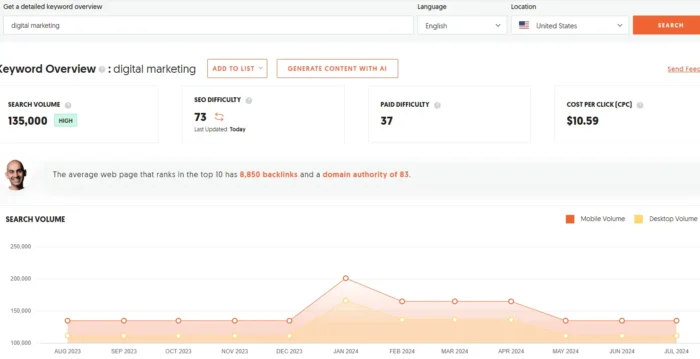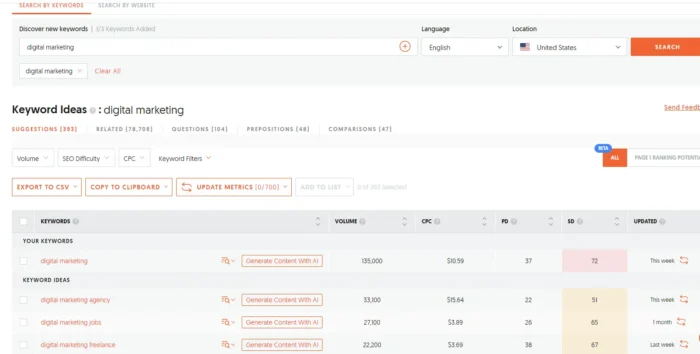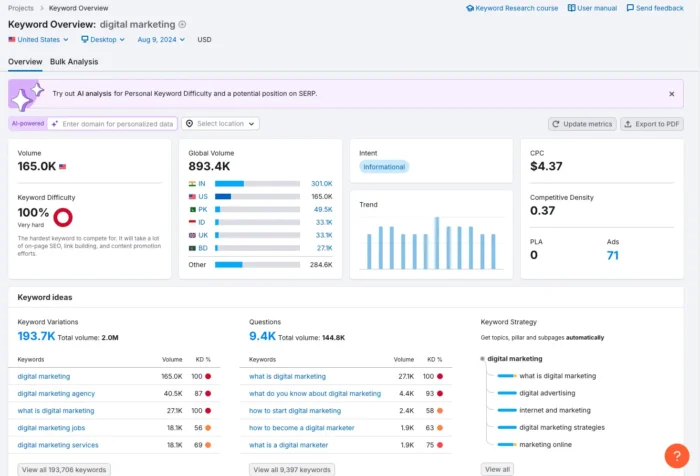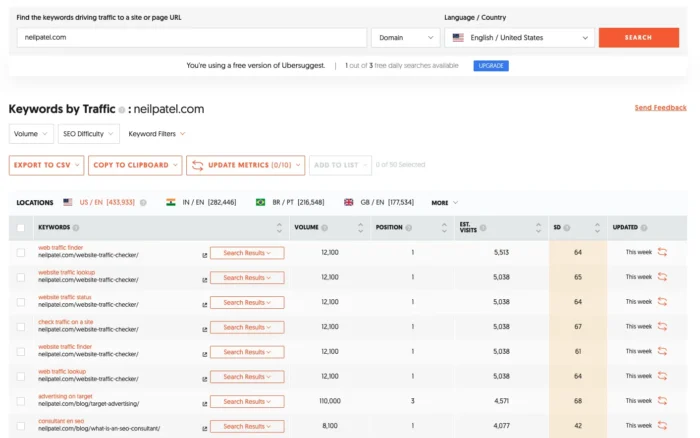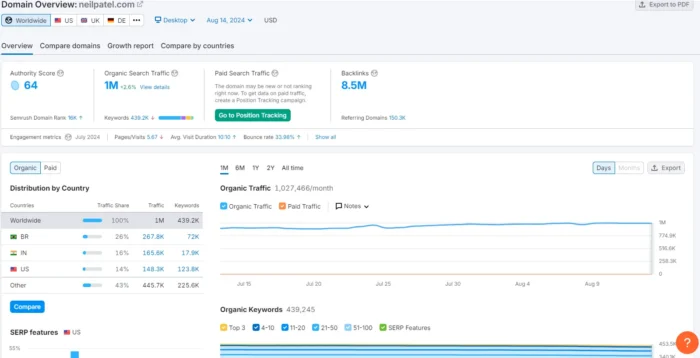You can categorize this list using five options at the top of the page: suggestions, related terms, questions, prepositions, and comparisons. The entire list can be exported as a CSV file or copied to your clipboard.
A unique feature of Ubersuggest is its keyword visualization tool, which visually organizes suggested keywords based on questions like how, what, who, where, and more. The Keywords by Traffic feature helps you quickly identify competitor keywords—simply enter a domain, and Ubersuggest will rank keywords by estimated visits.
Semrush’s Keyword Overview tool offers a similar experience, providing data on search volumes, difficulty, average CPC, and trends. It also includes keyword intent, SERP analysis, and related keyword lists. The Keyword Magic tool generates thousands of suggestions from a seed keyword, allowing you to filter them much like in Ubersuggest. However, it lacks visualization tools and pre-segmented lists.
One standout feature of Semrush is the Keyword Strategy Builder. Powered by AI, this tool creates a content map of pillar pages and related subpages from a set of seed keywords, offering a detailed foundation for building your keyword strategy—going beyond Ubersuggest’s related keywords and question-based suggestions.
While Semrush provides slightly more keyword data, it often requires digging through multiple features to find it. Ubersuggest, on the other hand, delivers all essential keyword information on its Keywords Overview page, making it easier to compile related keyword lists without needing to switch between tools.
Ubersuggest vs. Semrush: Which is Better for Competitive Analysis?
Competitor research gives you insight into your rivals’ SEO strategies, allowing you to leverage what works for them and exploit their weaknesses.
Ubersuggest offers two key ways to do this:
First, the Keywords by Traffic report reveals your competitor’s top keywords. You can sort them by search volume, estimated visits, search difficulty, and ranking position. There’s also a location filter for focusing on specific regions where you compete.
Second, the Traffic Overview feature provides a snapshot of your competitor’s overall SEO performance, including:
Monthly traffic estimates
Total organic keywords
Domain authority
Backlinks
Top pages
Top keywords
Rankings
Additionally, the Keywords Overview tab offers a quick view of the SEO landscape for any given keyword, showing average backlinks and domain authority for sites ranking on the first page.
Semrush offers several competitor research tools. The first is Domain Overview, which delivers a more comprehensive report compared to Ubersuggest’s Traffic Overview.
The Organic Research feature provides in-depth SEO insights, including keyword trends, keyword intent, position shifts, and SERP features. While this level of detail is valuable for enterprise SEO teams, it may be more than small business owners need if they’re primarily focused on keywords and backlinks.
For even more traffic data, you can use the Traffic Analytics feature, though this requires an additional subscription, pushing the total monthly cost to $428.95.
In summary, while Semrush offers more extensive competitive data, it comes with a significantly higher price tag.
Ubersuggest vs. Semrush: Which is Better For Website Audits?
Enhancing your website’s technical and on-page performance can significantly improve your rankings. So, how effectively does each tool help with site audits?
Ubersuggest excels at providing an easy-to-understand report on your site’s SEO health. By entering any URL into the Site Audit tool (whether it’s your own or a competitor’s), you’ll receive key insights such as:
On-page SEO score
Estimated monthly organic traffic
Organic keywords
Backlinks
The report also highlights SEO issues, including missing H1 headings and meta descriptions. Additionally, there’s a site speed test to evaluate your site’s compliance with Google’s Core Web Vitals, with options to test both desktop and mobile versions.
Semrush offers a similar Site Audit tool, delivering comparable results in terms of score and information provided when auditing your site.
Ubersuggest vs. Semrush: Which is Better For Backlink Analysis?
Backlinks are a crucial component of any effective SEO strategy. You need a tool that helps you analyze your site’s backlink profile and uncover link opportunities from your competitors.
Ubersuggest provides comprehensive backlink information through two key reports. The Backlink Overview report offers detailed insights including:
Domain authority
Total referring domains
Total backlinks
New and lost referring domains
Anchor text
The report also ranks each of these metrics and allows you to filter backlinks by domain authority, page authority, follow or nofollow status, and other attributes. You can export all this data to a CSV file.
The Backlink Opportunity tool simplifies finding competitor backlinks. By entering one or more competitor domains, you receive a list of referring domains that link to at least one of your rivals.
Semrush’s Backlink Analytics report operates similarly. Enter a domain to get a summary of:
Referring domains
Total backlinks
Monthly visits
Authority score
New and lost backlinks
Top anchor text
While Semrush automates much of this work, it may overlook some easy-to-capture opportunities that could quickly enhance your backlink profile. Between conducting your own research and relying on a tool, I know which approach I prefer.
Which Is The Better SEO Tool?
Choosing between Ubersuggest and Semrush ultimately depends on your business’s needs and goals.
If you’re on a tight budget, Ubersuggest offers the best value. You can secure a lifetime subscription for the cost of just one of Semrush’s monthly plans.
For enterprise companies, however, Semrush’s extensive features can be highly beneficial. Managing paid ads, social media, and SEO from a single tool simplifies operations.
But for those new to SEO or small businesses that only need essential SEO features, Ubersuggest’s user-friendly design and intuitive layout make it a strong choice.
Keep in mind that no SEO tool is flawless. Even the most extensive backlink and keyword databases provide estimates rather than precise metrics.
Ultimately, what matters is taking action. Choose the tool that you’ll use consistently and that provides the information you need quickly.
